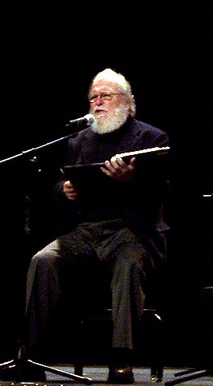
Peter Schickele was an American composer, musical educator and parodist, best known for comedy albums featuring his music, which he presented as being composed by the fictional P.D.Q. Bach. He also hosted a long-running weekly radio program called Schickele Mix.
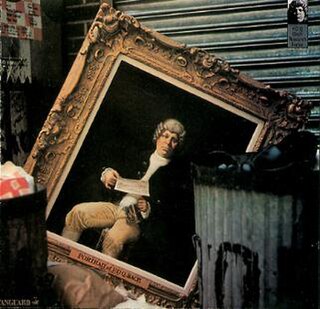
P. D. Q. Bach is a fictional composer created by the American composer and musical satirist Peter Schickele for a five-decade career performing the "discovered" works of the "only forgotten son" of the Bach family. Schickele's music combines parodies of musicological scholarship, the conventions of Baroque and Classical music, and slapstick comedy. The name "P. D. Q." is a parody of the three-part names given to some members of the Bach family that are commonly reduced to initials, such as C. P. E. for Carl Philipp Emanuel Bach; PDQ is an initialism for "pretty damned quick".

Johann Sebastian Bach composed the church cantata Wo soll ich fliehen hin, BWV 5, in Leipzig for the 19th Sunday after Trinity and first performed it on 15 October 1724. The chorale cantata is based on the hymn "Wo soll ich fliehen hin" by Johann Heermann.
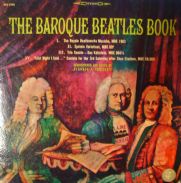
The Baroque Beatles Book is a record album by the American keyboardist and conductor Joshua Rifkin. Released by Elektra/Nonesuch in 1965, it takes musical themes of The Beatles and reworks them into Baroque style. The artwork on the cover, signed by illustrator Roger Hane, depicts classical composers reviewing the music to "I Want to Hold Your Hand," one of whom sports a Beatles t-shirt.
The Septet in E-flat major for clarinet, horn, bassoon, violin, viola, cello, and double bass, Op. 20, by Ludwig van Beethoven, was sketched out in 1799, completed, and first performed in Vienna in 1800 and published in 1802. The score contains the notation: "Der Kaiserin Maria Theresia gewidmet". It was one of Beethoven’s most popular works during his lifetime, much to the composer's dismay. Several years later, Beethoven even wished the score to have been destroyed, saying: "That damn work! I wish it were burned!"
Oedipus Tex is a satirical Western-themed oratorio by P. D. Q. Bach that follows the adventures of Oedipus Tex in Thebes Gulch. It was released on the album, Oedipus Tex and Other Choral Calamities in 1990.

Report from Hoople: P. D. Q. Bach on the Air was released on Vanguard Records in 1967. It is set up as a radio broadcast of the music of P. D. Q. Bach with Professor Peter Schickele as the DJ.

Portrait of P. D. Q. Bach was released in 1977 on Vanguard Records. The album features mostly the work of Peter Schickele writing as P. D. Q. Bach, with one contribution under his own name.

The Ill-Conceived P. D. Q. Bach Anthology is a collection of works by Peter Schickele writing as P. D. Q. Bach originally recorded on the Telarc label by the composer.
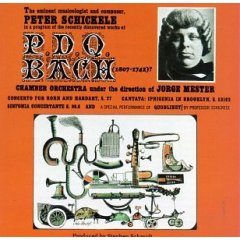
Peter Schickele Presents an Evening with P. D. Q. Bach (1807–1742)? was the first concert of and the first release of the music of Peter Schickele under his comical pseudonym of P. D. Q. Bach by Vanguard Records. The chamber orchestra was conducted by Jorge Mester. The album consists of musical parodies with commentaries by the composer.

An Hysteric Return: P.D.Q. Bach at Carnegie Hall is live recording of a P. D. Q. Bach concert in Carnegie Hall and was released on Vanguard Records in 1966.

The Stoned Guest is "the premiere recording of the Half-Act Opera by P. D. Q. Bach", the pseudonym used by Peter Schickele for parodic works. It was released on Vanguard Records in 1970. The title is a play on Dargomyzhsky's opera The Stone Guest. The record is a pseudo-radio broadcast hosted by "Milton Host" including an appearance by "Paul Henry Lung" as a contestant on the intermission game "Opera Whiz" hosted by Schickele.
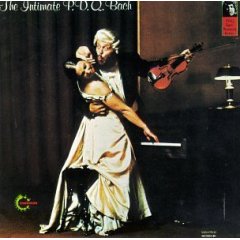
The Intimate P. D. Q. Bach is "a live recording of The Intimate P.D.Q. Bach stage show, featuring Professor Peter Schickele and the Semi-Pro Musica Antiqua" and was released on Vanguard Records in 1973. Many of the performer credits are humorous, and as with all P.D.Q. Bach recordings, the "S" numbers are fictitious and humorous. The cover art is a parody of the 1901 painting Kreutzer Sonata by René-Xavier Prinet.

Black Forest Bluegrass is a recording of the music of Peter Schickele under his comic pseudonym of P. D. Q. Bach, featuring the composer and "a bluegrass band with a Baroque orchestra, a wind octet with toys, a commercial with a snake — this album has it all!" The album was released on Vanguard Records in 1979.

Music You Can't Get Out of Your Head is a 1982 album of music by Peter Schickele writing as P. D. Q. Bach. The album describes itself as "P.D.Q. Bach’s answer to Haydn’s "Farewell" Symphony" and includes "all the music from The Civilian Barber that's been discovered." The album was released on Vanguard Records in 1982.

The Wurst of P. D. Q. Bach is a collection of works by Peter Schickele under his comic pseudonym of P. D. Q. Bach originally recorded on the Vanguard Records label by the composer. It includes "lowlights" from four different Vanguard albums: Peter Schickele Presents an Evening with P. D. Q. Bach (1807–1742)?, An Hysteric Return: P.D.Q. Bach at Carnegie Hall, Report from Hoople: P. D. Q. Bach on the Air, and P. D. Q. Bach's half-act opera The Stoned Guest. Wurst is the German word for sausage, with the album cover photograph set in a sausage shop.

Jesu, nun sei gepreiset, BWV 41, is a church cantata by Johann Sebastian Bach. He composed the chorale cantata in Leipzig for New Year's Day and first performed it on 1 January 1725 as part of his second cantata cycle. It is based on the hymn by Johannes Hermann (1591).
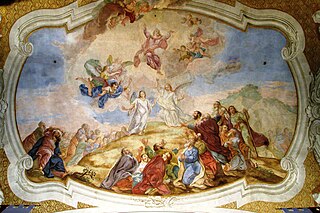
Gott fähret auf mit Jauchzen, BWV 43, is a church cantata by Johann Sebastian Bach. He composed it in Leipzig for the Feast of the Ascension and first performed it on 30 May 1726. It begins with a quotation from Psalm 47.

A chorale is the name of several related musical forms originating in the music genre of the Lutheran chorale:
















